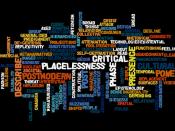From Enlightenment to Postmodernism.
The emergence of feminist theory, psychoanalysis, and postmodern philosophy served as catalyst for the transition from the Enlightenment to Postmodernism. The eighteenth century philosophical, political and scientific thought in search for freedom, equality and stability relied upon the belief in reason and rationality as its fundamental values. It depended on the binary structures so criticized and rethought by feminists and postmodern philosophers. In the postmodernist ideology the dominant force is technology which creates the possibility to govern nature and human beings. All the philosophical illusions of the eighteenth century that relied on knowledge and reason as a route to freedom are put into question by postmodernist replacement of "knowledge" by "competing explanations". In this paper, I will attempt to elaborate on the enlightenment thought and values through the presentation of theories and arguments of Rousseau, and Voltaire, Hume, Montesquieu, Wollstonecraft and Smith; and relate them to postmodernist thinkers such as Foucault, Rorty, and Lyotard .
The analysis of the works will highlight the changes in the political, economic, and social spheres.
The period of Scientific Revolution began in the seventeenth century and the scientific ideas solidified during the Enlightenment. Ever since then the world has been rapidly evolving with the help of scientific and technological progress which is not likely to cease in future provided that we omit the emergence of nuclear war. However, it is hard to deny something that is probable. In the twentieth century has emerged the widest diversity of airplanes, computers, as well as, nuclear, chemical, and biological weapons of mass destruction. All those were initially wartime devices that were created for destructive purposes. It is the consequence for which J.F. Lyotard blames techno scientific, artistic, economic, and political development for creating "the possibility of total war, totalitarianism", poverty, unemployment, as well...



"From Enlightenment to Postmodernism"
Very interesting to read despite its length, and very well-written. A great research tool, with a good bibliography in the end that others can use or refer to. Great job.
3 out of 4 people found this comment useful.